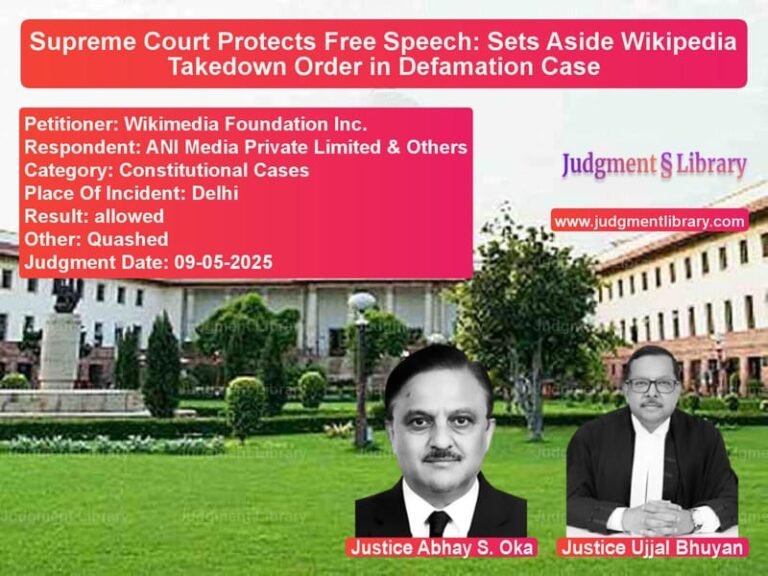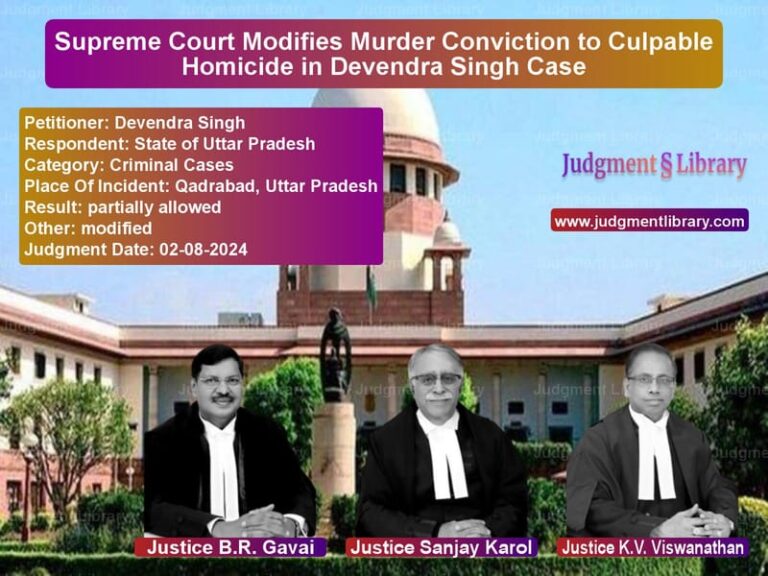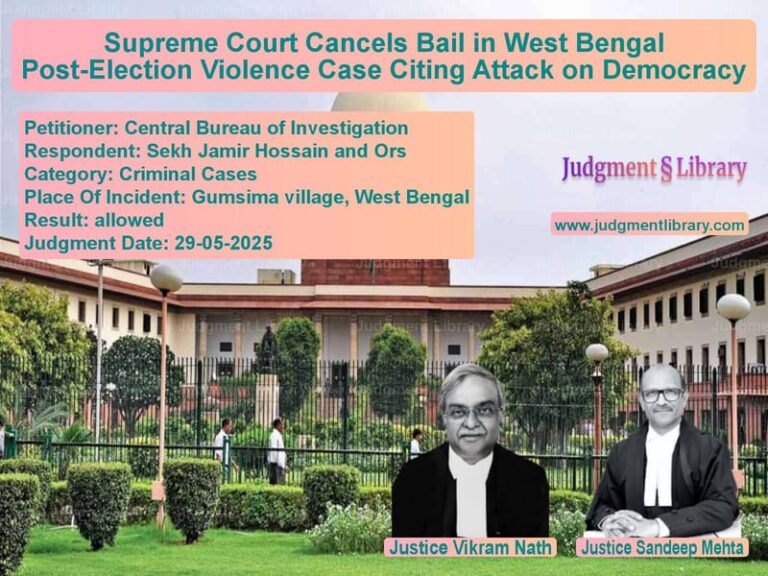Supreme Court Allows Redevelopment Near BPCL Refinery: A Landmark Decision on Urban Planning and Safety
The Supreme Court of India recently ruled in favor of a housing society seeking to redevelop its residential building located near Bharat Petroleum Corporation Ltd.’s (BPCL) refinery in Mumbai. The case, Satwaratna Co-op Housing Society Ltd. & Anr. vs Bharat Petroleum Corporation Ltd. & Ors., centered on whether safety concerns raised by BPCL were enough to halt a redevelopment project that had already been approved by the Municipal Corporation of Greater Mumbai (MCGM). This judgment is significant as it balances the rights of property owners with concerns over industrial safety and regulatory compliance.
Background of the Case
Satwaratna Co-operative Housing Society was established in the early 1970s, with a residential building that had since fallen into a dilapidated condition. The society’s members unanimously decided to redevelop the building, entering into an agreement with Kishraj Developers for reconstruction. After obtaining all necessary approvals from MCGM, construction commenced.
However, BPCL, which operates a large petroleum refinery nearby, raised concerns over safety, citing potential risks of fire, explosion, or terrorist attacks. BPCL filed objections with MCGM, arguing that allowing additional residential development in the vicinity of a high-risk industrial area was against public safety interests.
Key Legal Issues
- Whether the redevelopment project, which was replacing an existing building, constituted a fresh hazard requiring reconsideration of land-use approvals.
- Whether BPCL’s safety concerns were sufficient to override the property rights of the housing society members.
- Whether there existed any statutory or regulatory prohibitions against redevelopment in the area surrounding the refinery.
- Whether the municipal authority had erred in granting approval to the redevelopment project.
Arguments by the Petitioners (Satwaratna Co-op Housing Society & Developer)
The petitioners, represented by senior counsel, contended that:
- The redevelopment project did not introduce new residential use; it was merely replacing an older building with a structurally sound one.
- There were no laws prohibiting redevelopment in proximity to BPCL’s refinery.
- The approval process followed all necessary safety and zoning regulations as laid down by MCGM.
- Other similar residential buildings already existed in the area without objections from BPCL.
- The housing society members had a fundamental right to safe housing and redevelopment was necessary to ensure their safety.
Arguments by the Respondents (BPCL & Others)
BPCL countered with the following points:
- Allowing redevelopment would increase population density in the area, thereby raising the number of people exposed to risk in case of a refinery accident.
- The refinery was a high-risk zone that could be a target for industrial disasters or terrorist activities.
- The approval granted by MCGM did not sufficiently consider the safety risks posed by expanding residential use near hazardous industrial facilities.
- Permitting redevelopment could set a precedent, leading to more constructions near industrial zones, thereby compromising overall urban planning strategies.
Supreme Court’s Observations
The Supreme Court, after hearing arguments from both sides, made the following key observations:
1. No Express Prohibition on Redevelopment
The Court found that there were no laws or regulations that outright prohibited redevelopment near refineries. Justice Indira Banerjee noted:
“The absence of statutory restrictions suggests that the municipal authorities, having jurisdiction over zoning and safety, are best suited to determine the appropriateness of a redevelopment project.”
2. Approval by Municipal Authority is Valid
The Supreme Court upheld the validity of the MCGM’s approval, ruling that the municipal body had acted within its jurisdiction. The Court emphasized:
“Municipal planning bodies are entrusted with assessing safety and regulatory compliance. If they have granted approval after due diligence, courts should not interfere unless there is an evident violation of law.”
3. BPCL’s Safety Concerns Do Not Override Property Rights
The Court recognized the importance of safety but ruled that BPCL’s objections, while valid in general, could not singularly deny redevelopment rights to the housing society. It noted:
“While industrial safety is a legitimate concern, such concerns must be balanced against the property rights of citizens. Restricting redevelopment without a legal basis amounts to an arbitrary exercise of power.”
4. Remedy for BPCL: Acquisition of Property
As a potential solution, the Supreme Court suggested that if BPCL genuinely believed that additional residences posed an extraordinary safety risk, it could acquire the disputed property. The Court remarked:
“BPCL or other government agencies may explore acquiring the premises if they believe residential use is incompatible with refinery operations. However, such acquisition must follow due process and fair compensation.”
Judgment
The Supreme Court delivered the following verdict:
- Allowed the redevelopment project to proceed as per MCGM’s approval.
- Quashed the Bombay High Court ruling that had halted redevelopment.
- Directed that BPCL’s concerns be addressed through safety compliance measures rather than outright prohibition.
Implications of the Judgment
- Urban Planning and Industrial Coexistence: The ruling establishes a precedent for balancing urban development with industrial safety regulations.
- Property Rights Reinforced: The decision reaffirms that private property owners cannot be arbitrarily denied redevelopment without statutory backing.
- Government Agencies Must Act: If industrial establishments genuinely believe in restricting residential growth, they must either enact legal restrictions or offer compensation for acquisition.
Conclusion
This Supreme Court judgment is significant for both urban developers and industrial bodies. It reinforces the principle that regulatory objections must be backed by legal provisions and due process. Moving forward, municipal authorities and industries must collaborate to ensure safe urban planning while respecting property rights.
Petitioner Name: Satwaratna Co-op Housing Society Ltd. & Anr..Respondent Name: Bharat Petroleum Corporation Ltd. & Ors..Judgment By: Justice Indira Banerjee, Justice A.S. Bopanna.Place Of Incident: Mumbai, Maharashtra.Judgment Date: 26-04-2022.
Don’t miss out on the full details! Download the complete judgment in PDF format below and gain valuable insights instantly!
Download Judgment: satwaratna-co-op-hou-vs-bharat-petroleum-cor-supreme-court-of-india-judgment-dated-26-04-2022.pdf
Directly Download Judgment: Directly download this Judgment
See all petitions in Property Disputes
See all petitions in Landlord-Tenant Disputes
See all petitions in Specific Performance
See all petitions in Damages and Compensation
See all petitions in Judgment by Indira Banerjee
See all petitions in Judgment by A. S. Bopanna
See all petitions in allowed
See all petitions in supreme court of India judgments April 2022
See all petitions in 2022 judgments
See all posts in Civil Cases Category
See all allowed petitions in Civil Cases Category
See all Dismissed petitions in Civil Cases Category
See all partially allowed petitions in Civil Cases Category







